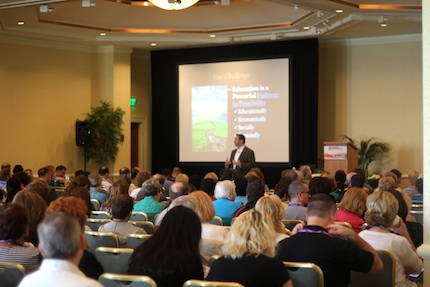Analytics, Blended Learning Keys to Educational Success
The current generation of college-age students could be the first to receive less education than the one that came before it. According to recent data, only half of those who start college complete their degrees--worse, only 12 percent among lower income students. "Education is a pathway to social mobility and personal efficacy," said Mark Milliron, chancellor of Western Governors University Texas, who delivered the opening keynote address at the Campus Technology 2012 conference taking place this week in Boston.
Most emerging jobs require post-secondary education. "We have to figure out how technology can make a radical difference in instruction to help people change their lives," said Milliron, the former deputy director for post-secondary improvement with the Bill & Melinda Gates Foundation.
Milliron, whose WGU Texas is a nonprofit university that provides accredited online and blended competency-based degrees, said tech leaders often meet with considerable resistance when they work to transform instruction to better meet the needs of students.
"I believe we have to anchor our conversations first in learning-centered education. We need to review all our practices with two burning questions: Do they improve or expand learning? And how do you know? What is the data telling you?"
On the other hand, he added, if technology use is branded as being about productivity gains and profits, the "immune system of education will be attacking it nonstop and we will never get where we want to go."

Mark Milliron, chancellor of Western Governors University Texas, delivered the opening keynote address at the Campus Technology 2012 conference taking place this week in Boston. Image by Tom Brown.
|
Rather than fighting the old battles of online versus on the ground, universities need to work on tuning the blend of those two, he said. "What is the way to deploy online tools to tune it to increase learning outcomes? Can we use technology to make the human moments more precious?"
Milliron made the case for accepting that we need an ecosystem of higher education providers ranging from research universities to community colleges to online-only schools. "How many students are living on campus and not working?" he asked the audience. "Less than 20 percent. Most students are working while going to school."
Understanding that diversity of learners, we should step back from our own institutions, think about our place in the ecosystem and welcome other models to the mix, he said.
One key initiative Milliron said he sees flowing from this focus on the learner involves learning analytics and personalization.
"If you think about engaging diverse learners, you have to get deadly serious about data," he said. With more data available than ever before, an analytics architecture is crucial; yet he argued, most data initiatives are "radically off target." He then described how the political and bureaucratic process of measuring an issue such as student retention and responding to it takes universities years.
Compare that to your experience shopping at Amazon. It takes Amazon under a second to make cross-selling recommendations. "There are two issues: target and velocity." Current data analysis projects are targeted at administrators and accrediting agencies and take way too long. They should happen much faster and be targeted to students, faculty and advisors. "We need to think about how we can get data to students and intervene before they drop out."
As important as this work is, Milliron reminded the tech leaders to buckle their seatbelts because, if they are willing to engage in these conversations on campus, they are going to hit some bumps in the road. "On one hand, you have the people who are caustic cynics and angry about everything," he said, "and on the other you have true believers who over promise and under-deliver." When conversations are dominated by bullies, some just people walk away. They just don't want to deal with it. "But our needs are too stark," he said. "We need to create more opportunities, especially for low-income folks, to move ahead. So dive into these conversations, and drive this change."
Running July 16-19 at the Seaport World Trade Center, the Campus Technology 2012 conference is bringing together faculty, instructional designers, information technologists, and campus administrators to explore how the latest in applications, social software, mobile tools, and immersive platforms can impact teaching and learning.
About the Author
David Raths is a Philadelphia-based freelance writer focused on information technology. He writes regularly for several IT publications, including Healthcare Innovation and Government Technology.